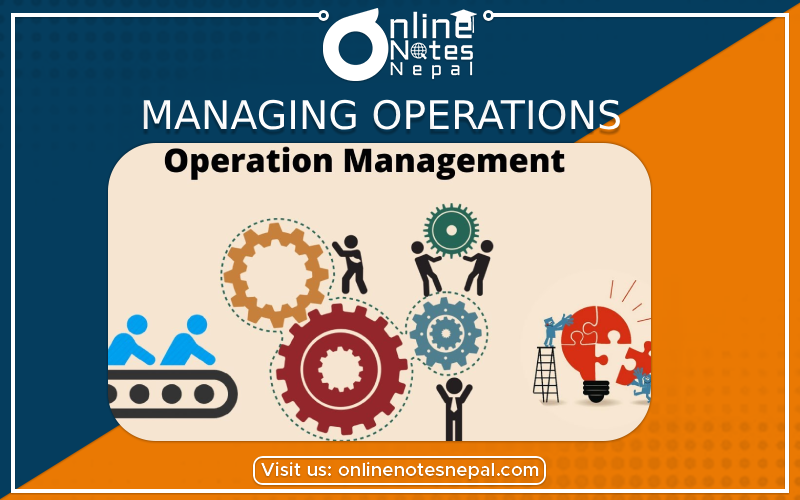Published by: Anu Poudeli
Published date: 10 Jul 2023

Overseeing and organizing numerous parts of a firm to ensure efficient and successful production of goods or delivery of services is what operations management entails. It includes tasks such as process design, organization, control, and improvement in order to increase productivity, quality, and customer happiness. Here are some significant operational management topics:
1.Operations Strategy: Creating a clear and coherent strategy that aligns with the overall aims and objectives of the firm. Making decisions on product design, capacity planning, site strategy, process selection, and supply chain management are all part of this.
2.Process Analysis and Design: Analyzing and designing processes for maximum efficiency and effectiveness. This comprises workflow mapping, identifying bottlenecks, removing waste, and implementing continuous improvement approaches like Lean or Six Sigma.
3. Capacity Planning : Capacity planning is the process of determining the ideal level of resources needed to meet demand while keeping costs and customer service levels in balance. This includes assessing historical data, anticipating demand, and making staff, equipment, and space decisions.
4. Supply chain Management : Management of the flow of products, information, and services from suppliers to customers is referred to as supply chain management. Sourcing and procurement, supplier relationship management, inventory management, logistics, and distribution are all included.
5. Quality Management : Quality management is the practice of putting systems and processes in place to maintain consistent quality throughout a company. Setting quality standards, performing inspections and audits, applying quality control systems, and developing a culture of continuous improvement are all part of this.
6. Project management : Project management is the planning, structuring, and control of projects in order to achieve certain goals within set restrictions. This comprises determining project scope, allocating resources, scheduling activities, risk management, and progress monitoring.
7. Performance Measurement : Performance measurement and key performance indicators (KPIs): Establishing key performance indicators (KPIs) to track and analyze operational performance. Measuring productivity, efficiency, quality, customer satisfaction, and financial performance are all part of this.
8.Automation and technology: Using technology and automation to improve operational efficiency and effectiveness. Implementing enterprise resource planning (ERP) systems, employing data analytics for decision-making, embracing digital technology, and exploring prospects in artificial intelligence and robotics are all part of this.
9. Human Resource Management : Human Resource Management is the management of a workforce and the promotion of a positive work environment. Workforce planning, recruitment, training and development, performance management, and employee engagement are all part of this.
10. Risk Management : Risk management is the process of identifying and reducing hazards that may have an influence on operations. Conducting risk assessments, implementing risk control measures, building business continuity plans, and monitoring and managing possible disruptions are all part of this.
These themes provide a basic overview of operations management, and each area can be investigated further depending on the specific industry and organizational setting.